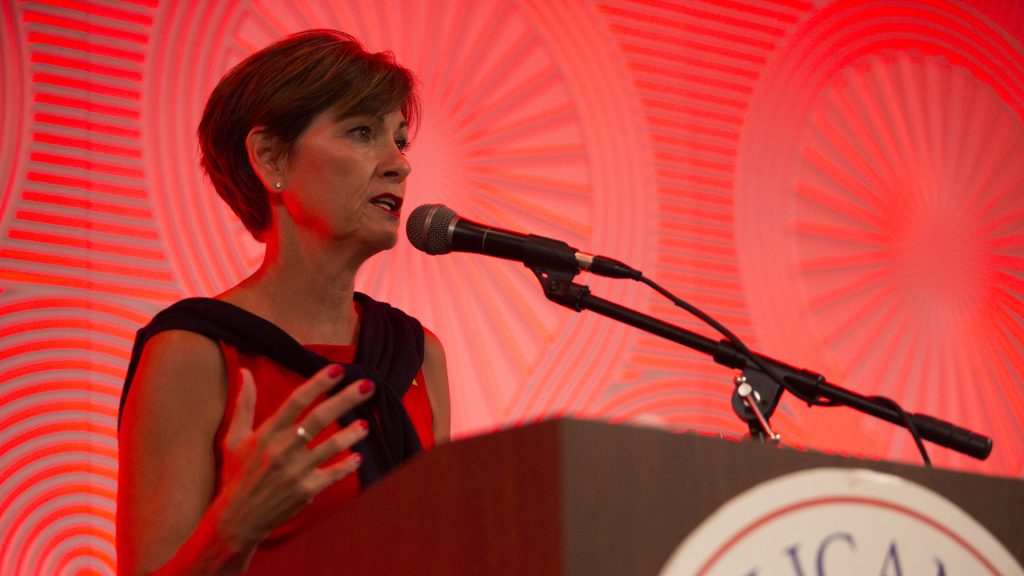A bill in the Iowa Legislature calls into question the line between free speech and discrimination.
Senate File 2344, a bill that would regulate how higher-education institutions handle free-speech, passed the Senate last week 29-20 with one legislator absent. It is now headed to a House education subcommittee for a vote today.
The bill, introduced by Sen. Amy Sinclair, R-Allerton, the chair of the Senate Education Committee, was criticized as a response to the lawsuit against the University of Iowa after the institution deregistered Business Leaders in Christ, a Christian student organization, in November 2017. The university argued that the group discriminated against a gay member by not letting him hold a leadership position.
RELATED: UI maintains support of free speech after Wisconsin protest policy change
The legislation states “a public institution of higher education shall not deny benefits or privileges available to student organizations based on the viewpoint of a student organization or the expression of the viewpoint of a student organization … [or] based on the student organization’s requirement that the leaders of the student organization affirm or agree to the student organization’s beliefs or standards of conduct or further the student organization’s mission.”
Daniel Hoffman-Zinnel, the executive director of One Iowa Action, a statewide LGBTQ advocacy organization, condemned the bill in an email statement.
“Freedom of speech is a necessity and bedrock principle of higher education,” Hoffman-Zinnel said. “However, this bill goes further than ensuring freedom of speech on college campuses. It gives campus groups the ability to discriminate against others because of who they are while accessing public funds and publicly subsidized venues.”
Legislators previously made an amendment stating public universities “may prohibit student organizations from discriminating against members or prospective members on the basis of any protected status recognized by federal or state law” after the bill initially passed the Senate Education Committee.
Sen. Herman Quirmbach, D-Ames, thought the amendment addressed the issue of discrimination nicely.
RELATED: Christian student organization temporarily reinstated in fight with University of Iowa
“When I first read the bill, it struck me that there was a lot of good free-speech language in there,” he said. “The restrictions seemed to be constitutional and well-motivated.”
However, the Senate struck down that amendment in its final floor vote, which prompted Democrats such as Quirmbach to oppose the bill.
“I thought there was a nice balance there, and I was very disappointed,” he said. “Frankly, I think the Republicans reneged on a compromise that had been adopted at the committee level.”
The issue of discrimination based on status or identity was scrutinized in the UI case. The organization argued that the university was not equally applying its Human Rights Policy to other student groups on campus that have language in their constitutions that limit access to leadership positions because of the organization’s beliefs.
RELATED: UI expels Christian student club over leadership requirement
One group examined in the case was Imam Mahdi, a Muslim-registered student organization. The organization’s constitution states it will guarantee equal opportunity and equal access to membership, programing facilities, and benefits to all. However, membership is granted in one of two categories: full membership or general membership.
According to Imam Mahdi’s constitution, all UI community members are entitled to general membership in the organization.
For full membership in the organization, an individual must be 18 years or older and be Muslim, Shia, and obtain the recommendation of two members. Full members have the right to vote in official elections to choose the organization’s representatives and hold elected office.
“You have to be a Shia Muslim [to be a full member] because we represent the Shia community here in Iowa City,” Imam Mahdi President Hayder Alalwan said. “It wouldn’t be reasonable to have a Christian talk about Shia or represent Shia. If you want someone to talk about your faith, this person should have a good knowledge about your faith so that they can give the right answers and right interpretation for people.”
As the bill moves through the Legislature, it is uncertain what implications it would have for organizations such as Imam Mahdi and Business Leaders in Christ if passed.



